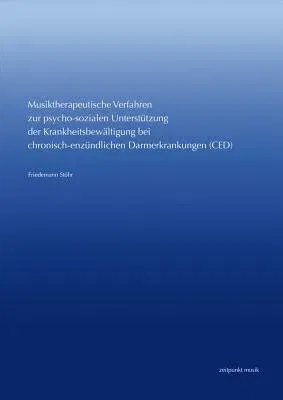Friedemann Stohr
(Author)Musiktherapeutische Verfahren Zur Psycho-Sozialen Unterstutzung Der Krankheitsbewaltigung Bei Chronisch-Entzundlichen Darmerkrankungen (Ced): EntwicklPaperback, 20 May 2016


Description
English summary: Currently over 320 thousand people in Germany suffer from a chronic inflammatory bowel disease (IBD) such as Ulcerative Colitis or Crohn's disease in which the side effects of psycho-social impairment have to be looked at as additional complicating factors.New information concerning the causes and effects of IBD led to a paradigm shift. For example, in the field of medicine, Crohn's disease is no longer considered an auto-immune condition but as a failure of the immune system to close down an attack. According to new research in the area of psycho-therapy, there is no typical profile for those susceptible to this condition. What was formerly considered to be the cause is now merely the resulting symptom.These recent changes have not yet been reflected in the current existing scientific research concerning IBD and music therapy.Although a life-long condition IBD progresses in phases. In between times of acute IBD activity, there are intermittent periods of apparent reduction in the symptoms. Therefore, those affected cannot count on stability but must always expect continual changes in their condition. However, other patients live with a constant progression in IBD activity levels. This is why it is especially important to help those dealing with the disease by providing them with psycho-social support. Music therapy using non-verbal methods can be extremely effective.This current concept is the trial to develop a system of practical music therapy which helps towards a creative way of life for IBD sufferers. Part one contains an overview of the medical causes and symptoms. The second section describes the life circumstances for an IBD sufferer. Part three outlines the general psychological and music-therapy research in the scientific literature and part four develops a reference system in which the criteria for music therapy are formulated and developed. These criteria are then referenced to relevant practical examples which are illustrated by real-life examples and case studies.The basis of the reference systems are the bio-psycho-social model, the understanding of sickness as salutogenesis and sense of coherence as described by Antonovsky, and also the Gestalt therapy with its awareness-excitement contact cycle, which give the framework for the starting point for psycho-therapy. The psycho-social treatment and support comprise: the containment of overflowing emotions, coping with stress, strengthening resilience by stimulating resources, development of coping strategies, encouraging compliance, to some extent the treatment of pain without medicine.Although the author does not conceal his personal involvement he is still able in this article to maintain the necessary scientific and therapeutic distance. German description: Uber 320 000 Menschen leiden z. Zt. in Deutschland an einer chronisch-entzundlichen-Darmerkrankung (CED) wie der Colitis ulcerosa (Cu) oder dem Morbus Crohn (MC), wobei die Begleiterscheinungen von psycho-sozialen Beeintrachtigungen als zusatzliche Belastungsfaktoren angesehen werden. Neue Erkenntnisse uber die Ursachen und Auswirkungen einer CED haben zu einem Paradigmenwechsel gefuhrt. Auf dem Gebiet der Medizin z.B. wird der Morbus Crohn nicht mehr als eine Autoimmunkrankheit sondern als eine Barrierestorung gesehen. In der Psychotherapie gibt es nach neusten Erkenntnissen nunmehr auch keine spezifische CED-Personlichkeit mehr. Was bisher als Ursache galt, wird nun als Folgeerscheinung der Krankheit gesehen. Die wenigen wissenschaftlichen Forschungsarbeiten, die sich mit Musiktherapie und CED beschaftigen, haben diese Veranderungen noch nicht einbezogen.Eine CED begleitet den Patienten ein Leben lang und verlauft meistens schubweise. Neben Phasen mit hoher Krankheitsaktivitat gibt es Abschnitte relativer Gesundheit und ein vorubergehendes Nachlassen der Krankheitserscheinung (Remission). Die Betroffenen konnen sich deshalb kaum auf einen stabilen Zustand verlassen und mussen sich standig auf einen verandernden Gesundheitszustand einrichten. Viele andere Patienten dagegen leben mit andauernden Aktivitaten der Darmentzundung. Deswegen ist es besonders wichtig, die Bewaltigung der Krankheit durch eine psycho-soziale Behandlung zu unterstutzen. Die Musiktherapie mit ihren non-verbalen Methoden kann dazu in grossem Masse beitragen. Das vorliegende Konzept ist der Versuch, ein anwendungsbezogenes musiktherapeutisches Referenzsystems zu entwickeln, das dazu beitragt, zu einer schopferischen und kreativen Lebensgestaltung bei einer CED zu gelangen. Dazu wird: 1. in einem medizinischen Teil ein Uberblick uber das Krankheitsbild und die medizinische Ursachenforschung gegeben; 2. die Lebenssituation bei einer CED beschrieben; 3. ein Uberblick uber die allgemeine psychologische und musiktherapeutische Forschung in der Literatur gegeben; 4. ein Referenzsystem entwickelt, in dem die Kriterien fur ein musiktherapeutisches Konzept herausgearbeitet und an ausgewahlten Beispielen praxisbezogen dargestellt werden. Erlebnis- und Praxisberichte sowie Fallbeispiele sollen dieses veranschaulichen.Grundlagen des Referenzsystems sind das bio-psycho-soziale Krankheitsmodell, das Krankheitsverstandnis der Salutogenese und der Koharenz nach Antonovsky, sowie die Gestalttherapie mit ihrem Kontaktzyklus Gewahrsam-Erregung-Kontakt, die den Rahmen des psychotherapeutischen Ansatzes beschreiben. Zu den psycho-sozialen Behandlungs- und Unterstutzungsformen zahlendas Auffangen von uberschwemmenden Emotionen (Containment), die Stressbewaltigung, die Starkung von Resilienz durch Aktivierung von Ressourcen, das Entwickeln von Copingstrategien, die Forderung von Complianceund (ansatzweise) die nichtmedikamentose Schmerzbehandlung.Der Autor verhehlt nicht seine personliche Betroffenheit, schafft aber mit dieser Schrift immer wieder die notige wissenschaftliche und therapeutische Distanz.